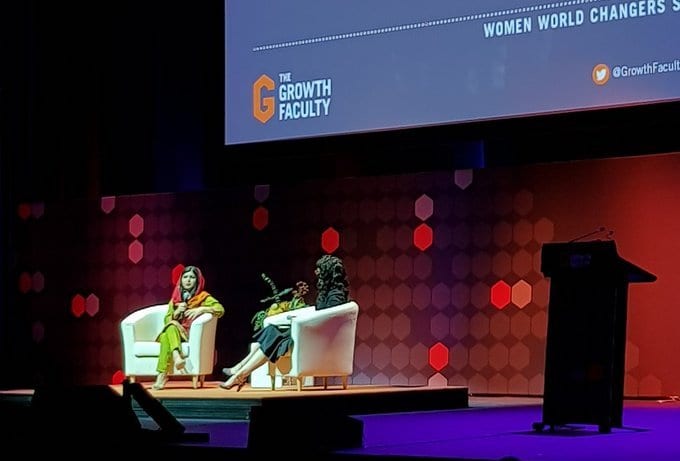She declared as much taking to the stage in Sydney last night, saying that she started speaking out at the age of 11 and never let her age get in the way, nor the Taliban. “They tried to silence me, but they failed,” she said.
It was a fitting day for the youngest ever Nobel Peace Prize recipient to speak at The Growth Faculty event, on the seventieth anniversary of the Universal Declaration of Human Rights being ratified.
She said that investing in the education of girls is the best investment we can make – not only for the lives of those girls who benefit, but also for the future of the world.
It ensures the wider participation of the population, can give girls more control and choice over their fertility – potentially limiting population growth – and help ensure humanity benefits from a wider pool of talent, which may lead to solutions to some of the most complex challenges of our time. The wider benefits could include tackling climate change, providing better health outcomes, and achieving a more equitable distribution of resources.
Yousafzai also spoke about the influence her father had on her life – saying it wasn’t only about what he did, but what he didn’t do. “He didn’t clip my wings,” she said. “My story is different because my dad allowed me to speak.”
She shared what she witnessed as a child living under the Taliban in Pakistan: the bodies she saw in the square, the numerous people being killed every night, the 4000 schools that were destroyed, and what it felt like to lose her future and her dreams when girls were banned from going to school. She started blogging for the BBC at the age of 11, sharing her experiences and speaking out for children’s education. Four years later at 15, a masked gunman stormed the bus she was taking on the way home from school and shot her in the head.
Thinking the Taliban would have some sympathy for a child, she never thought she would be a target and feared more for her father.
And she spoke about the moment she opened her eyes in hospital in Birmingham, UK, after a week in an induced coma. She asked about her father and was immediately worried about who was going to pay for the treatment she was receiving. She didn’t know how many people were following her story.
“The terrorists had tried their best and they did what could be their last attempt and they still failed and that to me was just evidence of how strong my voice was,” she said.
Asked where she gets her courage from, Yousafzai said it was a matter of having no other choice when her right to an education – and therefore her future — was taken away by the Taliban. “I knew I had to do something. For me, it was raising my voice.”
Yousafzai also urged the audience to see the humanity in refugees and understand that those who are displaced have no option but to leave their homes.
Diversity is not a threat, but an opportunity to connect with others. “We should not be hostile, we should not be cruel. Let’s be more human regarding refugees,” she said.
With plenty of mothers and fathers in the crowd with their daughters, Yousafzai offered numerous messages to the young people in the audience, including to never let their age – or any kind of weakness – get in the way. “The first step to overcoming your weakness is to not consider it a weakness,” she said.
And don’t take your education for granted. Take advantage of it and find your potential.
Yousafzai will speak in Melbourne tonight.
A cochlear implant helped @Malala think she could overcome any weakness. #hearingloss is what is perceived as a weakness #malala18 @CochlearGlobal @growthfaculty #WomenInSTEM pic.twitter.com/UTJYaZkHVH
— Payal Mukherjee (@Payal_Aus) December 10, 2018


